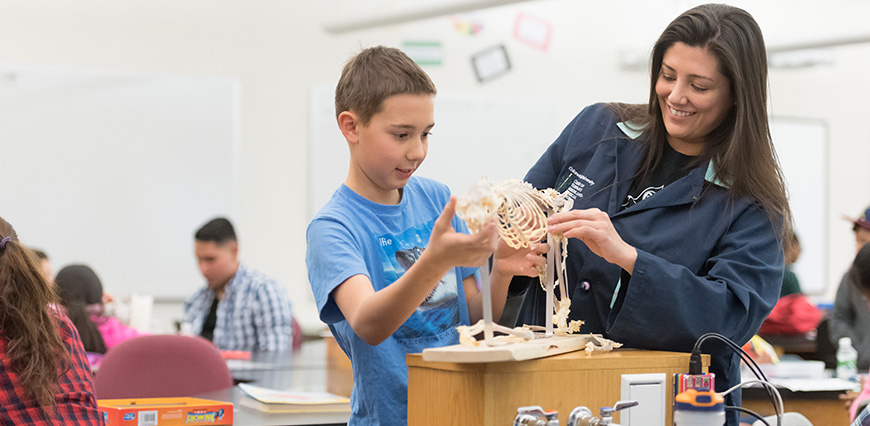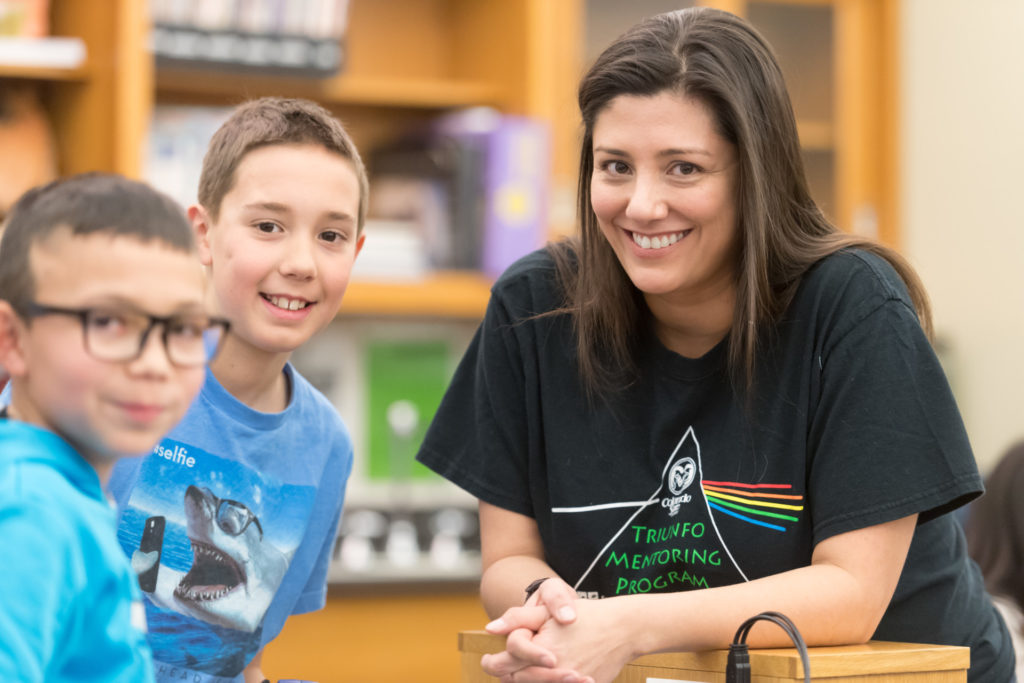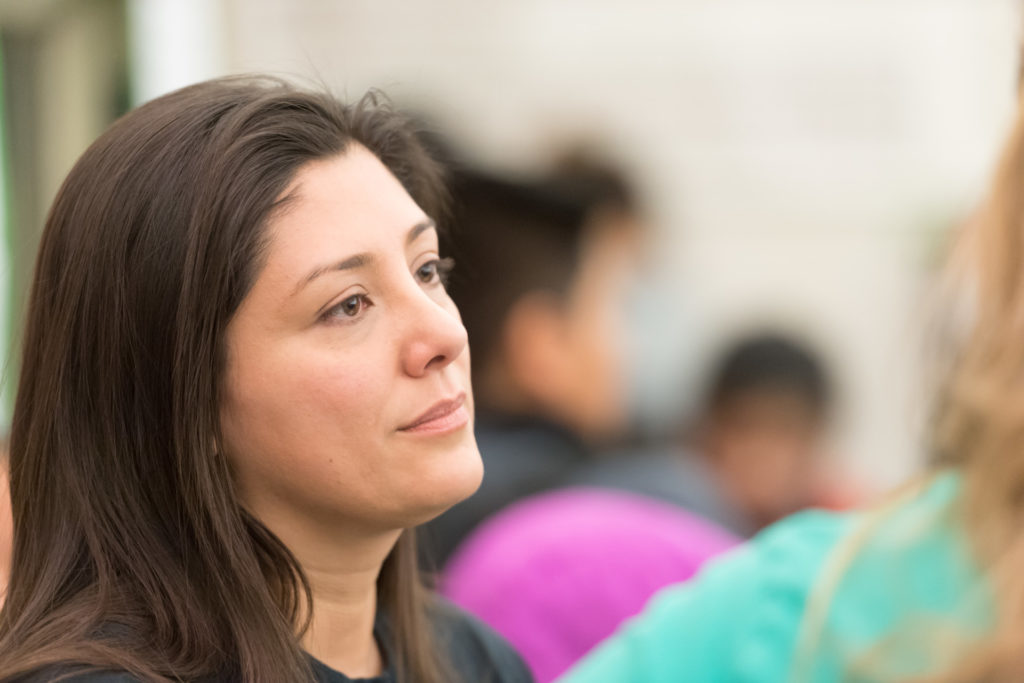First-generation CSU veterinary student shows ‘This is what it looks like’
by Coleman Cornelius | March 7, 2017 9:29 AM

Cindy Vaca, a third-year veterinary student at Colorado State University, sat with a 9-year-old Hispanic boy in the corner of a spacious laboratory on campus and pieced together a cat skeleton using Elmer’s glue and a homemade scaffold.
“Sebastian is so smart, he doesn’t have any homework. We’re working on mine,” Vaca said, beaming at her fourth-grade partner with a feline thigh bone in her hand.
In this nook, surrounded by bilingual science books, there is yet another homework assignment underway. It’s more important than building a cat skeleton, and it’s an assignment Vaca has given herself: She is modeling college success for a roomful of local Latino schoolkids.
“I didn’t know a single Hispanic college graduate until I was in high school, so I was convinced that college was for other people,” said Vaca, a first-generation college student who grew up in Los Angeles with a family from Costa Rica and Ecuador. “I wish that someone who looked like me had talked to me about my college plan as a reality, not a fantasy.”
Vaca is among dozens of CSU students who volunteer for a community outreach program called Triunfo[1], Spanish for “Triumph,” which pairs college students with mostly Hispanic schoolchildren for homework help and activities that boost knowledge in science, technology, engineering and math.
Every Thursday afternoon, 60 elementary students ride buses from their schools to CSU for more than an hour of tutoring. They literally “go to college” with one-on-one help from mentors who, in many cases, are from underrepresented racial and ethnic groups and are the first in their own families to seek higher education.
“When I was growing up, there was this idea that if God wants you to go to college, something magic will happen to make it so. But that’s not a college plan. What we need to do is be present and just say, ‘This is college. This is what it looks like,’” Vaca said, gesturing to her face and wearing a blue laboratory coat that distinguishes CSU veterinary students.
Dedication, leadership, service
 [2]
[2]For three years, Vaca has volunteered with Triunfo to help with schoolwork and to instill an understanding among Hispanic kids that attending college and pursuing career dreams is “100 percent an option.” Vaca is so passionate about Triunfo and its cause that she persuaded eight other veterinary students to sign on as mentors this year; it’s a notable commitment for students in the notoriously rigorous professional program.
Her dedication is one reason Vaca earned the Dr. Jack Walther Leadership Award from the Western Veterinary Conference, an honor that promotes lifelong service to the profession. With the award, Vaca is one of 33 North American veterinary students attending the 2017 WVC annual meeting in Las Vegas this week. The meeting features laboratory sessions and presentations with international veterinary leaders.
It’s no surprise that Vaca earned the prestigious leadership award, her friends in Triunfo said, as they discussed how to transport the elementary students to campus for the annual Veterinary Teaching Hospital Open House in April. The field trip is just one of Vaca’s goals in the mentoring program.
“Cindy gets an idea, and the rest of us try to hang on,” said Lynne Judish, lab coordinator for the College of Natural Sciences Education and Outreach Center, where Triunfo meets each week.
A mutually beneficial program
Many CSU tutors volunteer with Triunfo to encourage Latino schoolchildren, then discover that the commitment is mutually beneficial, said Andrew Warnock, director of the Natural Sciences Education and Outreach Center. The center runs Triunfo in collaboration with El Centro, a program of the CSU Division of Student Affairs.
“Coming here once a week to help younger kids reminds our CSU students why they’re here and how they got here,” Warnock said. “College kids say this tutoring program is one of the reasons they stick with college. I see it as a good retention tool.”
Jake Rodgers, a second-year veterinary student, reiterated the point as he reviewed a social studies writing assignment with a fourth-grader named Marcos.
“When I’ve been in school all day, focused on my classes and my grades, this is a good opportunity to give back and appreciate the fundamental aspects of education. It’s been really awesome,” Rodgers said.
During a recent session, Vaca explained to her young partner that she positioned the skull of her cat skeleton with its lower jaw extended, as if the predator were baring its teeth, ready to pounce. The position makes sense, she explained, because a cat in the wild is an “obligate carnivore,” meaning it eats only meat.
 [3]
[3]“As a veterinarian, it’s really important to know the different parts of the cat skeleton because they’re so different from dogs,” she told the younger student, Sebastian Fuentes. “Cats are carnivores, so they have fewer teeth than dogs, but they’re much sharper.”
Sebastian smiled as he grasped the connection between an animal’s diet and its dental anatomy.
“That’s really cool,” he said, adding, “My brother would probably really like this because he really likes cats. Sometimes he hisses at me when he’s mad.”
When asked about his college plan, the fourth-grader said without hesitation that he will attend the U.S. Air Force Academy in Colorado Springs and will become a scientist. Vaca grinned and nodded as she listened.
Throughout high school, Vaca was an over-achiever who took Advanced Placement classes and competed on the speech and debate team, “but the idea of going to college and paying for college was not for me,” she said.
With that ethos, Vaca graduated from high school and for four years held administrative support jobs. Then she decided to reset her educational path.
“I just got fed up with being a clerk,” she recalled. “It wasn’t an epiphany. I just said, ‘I need to try again.’”
Vaca attended California State University, Los Angeles, and earned a bachelor’s degree in biology before entering CSU’s Doctor of Veterinary Medicine Program. Having grown up with pets in an animal-loving family, she hopes to practice small-animal medicine.
But before that, Vaca wants to embolden other students, kids who are in many ways younger versions of herself and need a change in mindset to embark on college.
“I know that the difference between a kid going to college and not going to college is just knowing it will happen,” she said.
For information about Triunfo, or to contribute to the program, visit the program’s website[4].
- Triunfo: http://cns-eoc.colostate.edu/triunfo/home.html
- [Image]: http://source.colostate.edu/wp-content/uploads/2017/03/08020_01316.jpg
- [Image]: http://source.colostate.edu/wp-content/uploads/2017/03/08020_01319.jpg
- website: http://cns-eoc.colostate.edu/triunfo/home.html
Source URL: https://source.colostate.edu/first-generation-csu-veterinary-student-shows-looks-like/
Copyright ©2024 SOURCE unless otherwise noted.